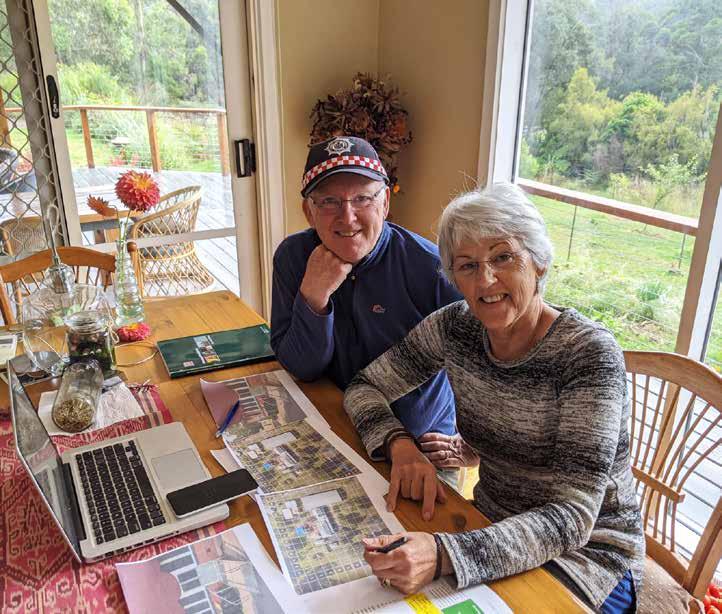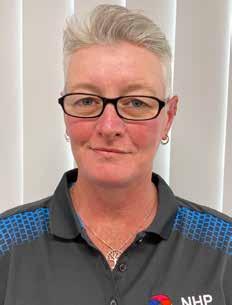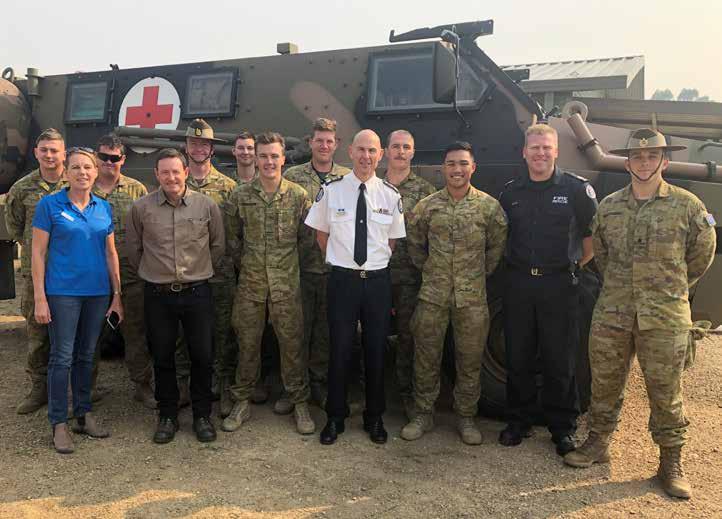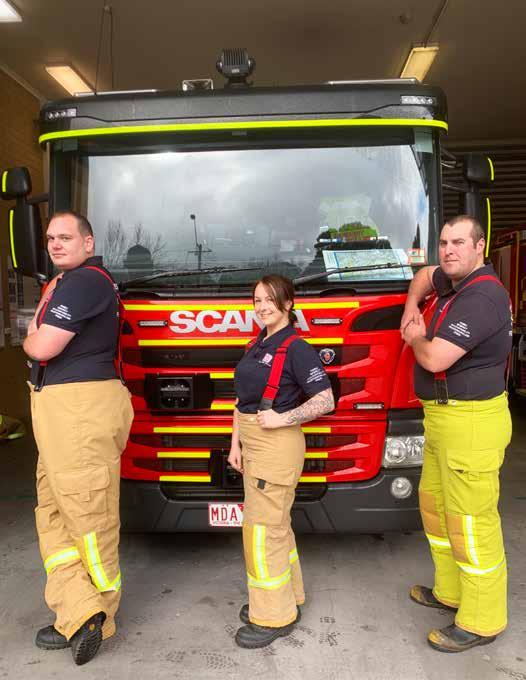
10 minute read
Business as usual during pandemic
Business (almost) as usual during COVID-19
Chirnside Park brigade takes fire safety online
Advertisement
How do you take a fire station to the classroom during a pandemic? Chirnside Park Fire Brigade member and Fire Safe Kids presenter Dan Ennis was determined to make sure that the show went on for the kids at Chirnside Park Primary School. Dan and Hayley Ennis converted their spare room into a studio and went to work presenting a live, virtual education session called ‘Meet the Firefighter’ for 10 students who were still attending school. Dan, who led the session for the kids in grades 3 to 6, said, “We thought about how we could support the teachers and still present a session in a fun and engaging way. “Technology has enabled us to cross the social distancing boundaries and continue to engage with our local community,” he added. “I’m extremely proud of Dan and Hayley’s effort in adapting the Fire Safe Kids Program to push the home fire safety message to young students and support the teachers who are doing a wonderful job during these tough times,” Chirnside Park Fire Brigade Captain Ben Cash said. “Given the number of people who have stayed at home and worked from home during the pandemic, it was the perfect time to educate the community about the dangers of fires starting in the home.”
Noojee brigade training continues from home
Members of Noojee Fire Brigade adapted quickly to the restrictions imposed by the pandemic, including David and Jean Edney, pictured. Brigade members met each other from the comfort and safety of their own homes via
teleconference to work through a training exercise involving a structure fire scenario. Activities included simulated radio calls, establishing a fireground channel, map and grid referencing, identifying hazards, assembling crew leaders, and planning discussions to decide the best way to approach and contain the fire. This was then followed by a friendly chat and a few laughs between members to boost morale and keep them connected. The remote training has worked well for them. They are learning new online skills and keeping in touch with each other, which has been good for their wellbeing.
Maryborough meets online
Maryborough Fire Brigade held a virtual brigade meeting for the first time in its 158year history during the pandemic. “On what normally would have been our election meeting we held our very first meeting using Webex, a CFA meeting platform recently offered to our brigade through the joint efforts of the Volunteer Sustainability Team and ICT,” Maryborough member Raelene Williams said. “The meeting was a great opportunity to help keep some normalcy within our brigade and help with the isolation that we are all feeling. “At times it was hysterical to watch our less tech savvy members work out videos and microphones with younger family members being seen to assist with the set-up. “The key unexpected benefit that resulted was the opportunity to laugh together, to share our frustrations and to reconnect in a visual way that sent spirits soaring. “It was uplifting and was unanimously voted in as our new weekly communications medium.” Raelene is also CFA’s Volunteer Sustainability Manager and said there has been a strong uptake of CFA’s video conferencing options among volunteer brigades. “We’ve received more than 100 requests to support brigades in connecting this way. “I would like to make a special mention and say thanks to Niki Habibis, Maddy Macan and Swapnil Thakkar from VST along with Steve McCormack, David Beards and Paul Brown from ICT for making this possible for our volunteer brigades. “The quick turnaround to get this project off the ground was exceptional and had tangible and positive impacts in the field.”
Turning out with type 2 diabetes
Gaybrielle was first diagnosed with gestational diabetes in August 2007 when she was pregnant with her son. Gestational diabetes is a type of diabetes that can occur in the second part of pregnancy and usually goes away when the baby is born. The diagnosis includes a higher than normal blood glucose level during pregnancy. “Being diagnosed was a huge wake-up call,” Gaybrielle said. “Gestational diabetes is a little different to normal diabetes because it’s not only yourself you’re taking care of, it’s your baby as well. “I was injecting insulin four times a day while I was pregnant, because my body wasn’t producing enough.” Women who’ve had gestational diabetes have an increased risk of developing type 2 diabetes. This is a chronic condition where your body either resists the effects of insulin – a hormone that regulates the movement of sugar into your cells – or doesn’t produce enough insulin to maintain normal glucose levels. “After my son was born I was diagnosed with type 2 diabetes,” Gaybrielle added. “I’ve had diabetes for over 12 years and over time I have learned to manage it. “I actually don’t inject insulin at all anymore; instead I’m taking three types of medication that I take twice a day.

“Alongside the medication I try to lead a healthy lifestyle which includes a balanced diet, staying fit and getting regular heath checks to make sure my eyesight, circulation and teeth are healthy, as diabetes can affect all these things. “Being diagnosed with diabetes has been a game changer for me. It’s affected every part of my life including volunteering with CFA.” Gaybrielle joined Broadford brigade in 2010 and is currently a community education officer, Fire Safe Kids coordinator and a Junior leader. “I have learned to control my adrenaline since being in the brigade,” Gaybrielle said. “Adrenaline can use a lot of important sugars in my body that I can’t replace. “My diabetes is something I have to constantly be aware of. When attending incidents I have to recognise how I’m feeling and prepare beforehand. I wear a bracelet that explains what type of diabetes I have and what medication I take. I’m very open about my diabetes as I think it’s vitally important for members to be aware of my condition and spot when I may need help or a break.” Gaybrielle was deployed to New South Wales last November to support the Black Summer fires. “While on deployment I found myself with a crew I had never met, “ Gaybrielle said. “As we introduced ourselves, I made the team aware of my diabetes and any warning signs and how to react. It’s important for diabetics to inform members of their condition to keep themselves safe. “Whenever I had breaks after working hard, I asked a member to check on me if I wasn’t back in a few minutes. “If I work hard and sweat, I might get hungry and that means my sugar level has dropped, I may become jittery and need a couple of mouthfuls of Staminade and I’m ready to go again. Diabetes is a condition that’s easily controlled as long as you take care of yourself and listen to your body. “There’s nothing I can’t do as a firefighter as long as I’m prepared and communicate with my team.”
Recovery continues in north-east
More than eight months on from the 2019-20 bushfires, the Upper Murray community is still recovering. While green regrowth has sprung back across the region, and support and hard work from the community and beyond has helped with damaged fences, the impact remains for those who live locally and were directly impacted. “There’s a long way to go for these communities, not just from a physical perspective in re-establishing infrastructure, but also the huge mental health implications,” CFA District 24 Commander Brett Myers said. Since the fires, Brett has been working with CFA volunteers to help them through some of the tough times. “The area of the Upper Murray is part of my normal CFA catchment responsibility, but in the light of what occurred earlier this year there was a significant impact on CFA members. “Once I was out of the response role, my job was to spend quite a bit of time in the
70

area, providing compassion and support for those people.” Across the north-east, 71 residential and 205 non-residential structures were destroyed or damaged by fire over last summer. Brett said about 150 CFA volunteers were impacted either through losing their homes or through associated mental health issues. “They’re an incredibly resilient community in the Upper Murray and often wouldn’t be used to leaning on peer support programs, so it was helpful for them to be able to have a chat with a like-minded person who has already built a relationship with them. “Most of the time I was accompanied by a peer support officer as well of course, not only to help our CFA people through those tough times, but also to support me in having those conversations.” Brett’s existing relationships have also helped with the interagency response. “Tony Long is a former DELWP fire officer in the region and is now taking the lead
In January 2020 Commander Brett Myers led Emergency Management Commissioner Andrew Crisp around the Upper Murray
operational role with Bushfire Recovery Victoria, so that really helps it work well. “We’re not quite as involved in the overall community recovery piece as we were during the response phase, as there are more appropriate organisations for that. But many of our CFA people are leaders in their communities so we’re still engaged, just not taking the lead role.” Support for all CFA members and their families can be found at cfa.vic.gov.au/volunteer-careers/ welfare-services-for-families or through the CFA Wellbeing Support Line on 1800 959 232.
Promoting inclusion at Ferntree Gully
Ferntree Gully Fire Brigade in the foothills of the Dandenong Ranges has always been known as a welcoming place, where new and transferring members are made to feel a part of the Gully crew as quickly as possible. New members are mentored closely for the first year of their firefighting apprenticeship and are encouraged to be as involved as possible in the running of the brigade. “We’ve found that member retention is directly related to how quickly we can

engage new members in the running of the brigade,” Captain Seamus Smith said. “When they feel part of it, and share in the successful outcomes, we all achieve.” This inclusiveness has also been woven into the values that are important to the brigade. Seamus explained that a few years ago the brigade had a review and part of the process was deciding core brigade values. These are family, respect, accountability, professionalism and pride (FRAPP). “FRAPP raised a laugh at first, however once we put it on all our internal reports and programs and on the sleeves of our station gear polo shirts it became real,” First Lieutenant Simon Steele said. “FRAPP became part of our day-to-day language and was used as a reference to the best practice and behaviours we aspire to.” Ferntree Gully members demonstrate this practice in every aspect of training, presentation and operations. Over the years, the brigade has become more diverse in terms of member age, gender and cultures, and the brigade is seen as a reflection of the local community. Long-serving volunteer Graham Crichton, who’s responsible for the brigade’s community safety program, remembers a very different time. “Back in the dark ages this was a very male-dominated environment,” Graham said. “Thankfully, this has now changed and the brigade has a gender diverse membership and members who are from all over the planet. This makes for a membership where everyone is equal and the diversity is welcome.” Firefighter Steph Smith, a member for more than six years, noted that a few years ago the brigade made sure there was a feminine hygiene pack placed on every vehicle to make sure women were not in any way restricted while working operationally. “That inclusion on vehicle inventories made a real difference to members being able to operate while on the fireground or during extended activities,” Steph said. “No one batted an eye and we all wondered why we hadn’t done this years ago.” For more about the rollout of hygiene kits across regions, see the story on page 28. Brigade members don’t use the words diversity and inclusion in day-to-day language. However, the way they operate ensures that behaviours and how members treat each other reflect the brigade’s values. For this to continue, it’s essential to keep a close eye on the functioning of the brigade on a daily basis to ensure we all keep practising FRAPP. So far so good.










